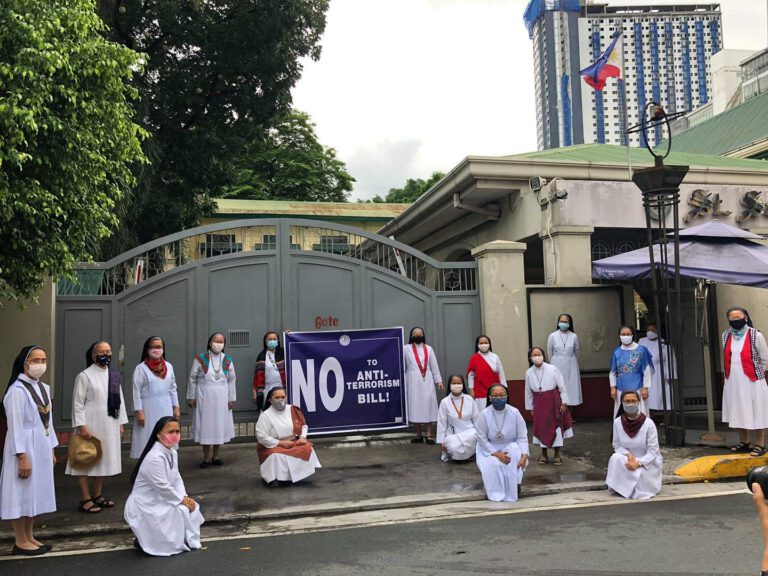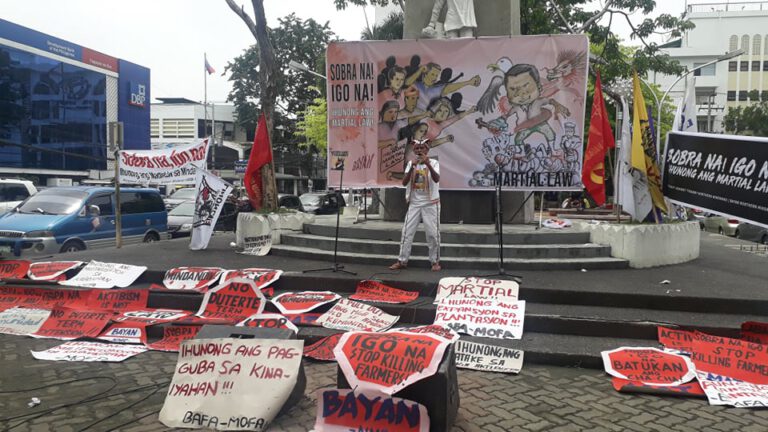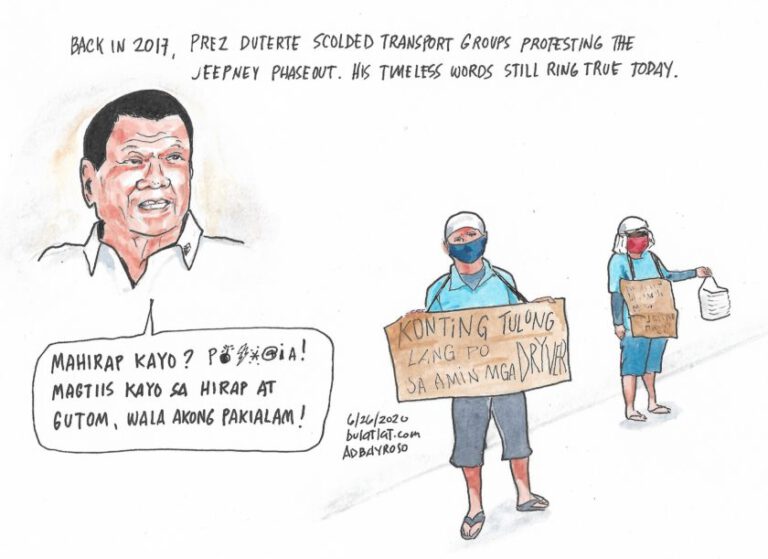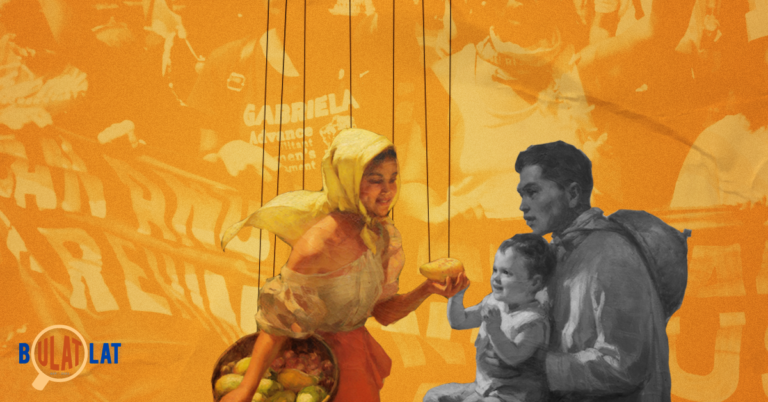Authorities arrested on Friday seven Lumad whom they claim are New People’s Army members in an operation in Barangay Blanco, Balingasag town in Misamis Oriental, a charge condemned by the Lumad group Kalumbay.
Religious groups raise concern against anti-terror bill as 30-day deadline nears
“Worrisome are the expanded and vague definitions of a “terrorist;” the powers given to the Anti-Terror Council to designate a group as a “terrorist group;” the weakening of the protection of one’s privacy and the safeguards against arrests and detention without warrants.”
By RITCHE T. SALGADO
Bulatlat.com
MANILA — As the legal experts of Malacañang continue to study the Anti-Terrorism legislation of both Houses of Congress, and as the 30-day deadline for the president to decide to veto the bill is fast approaching, peace loving Filipinos continue to grow anxious on the possible passing of a law that undermines the freedom and security of many Filipinos who choose to uphold their democratic right to redress and for peaceful assembly.
While the Catholics Bishops Conference of the Philippines (CBCP) has yet to speak out on the anti-terror measure, several Bishops, religious, and diocesan clergy have issued strong condemnation on the measure.
Recently, the clergy of the Archdiocese of Manila said that national security should not be an excuse to undermine human rights and civil liberties. “To do so makes the government terrorist against its own people,” it said.
The Association of Major Religious Superiors in the Philippines (AMRSP), meanwhile, pointed out that it is troubling that such a measure is passed at a time when the country is faced with a crisis.
“While our embattled nation continues to suffer from the tempests of the COVID-19 virus and its effects on the lives of millions of Filipinos… the leaders of the land have, unfortunately, been trying to fast track the passage of the controversial House Bill (HB) No. 6875,” it said in a statement.
In an interview with Bulatlat, AMRSP Co-Executive Secretary Fr. Angel Cortez, OFM said that this action seeks to silence critics who pointed out government’s failure in responding properly to the pandemic that has killed more than a thousand Filipinos and inflicted almost 35,000 and has affected the whole country.
“There are more people who are killed by the government’s war on drugs,” he said, adding that even the religious are not spared with red-tagging, freezing of accounts, trumped up cases, and others. “Who is the terrorist now?” he asked.
Cortez cited the case of the Rural Missionaries of the Philippines, the longest mission partner of AMRSP, saying that the government has been terrorizing the group for doing its missionary work in empowering poor farmers and indigenous peoples in the rural areas.
The embattled missionary group’s bank accounts were frozen by the Anti-Money Laundering Council (AMLC) early this year for suspicions of terrorism financing. Last year, charges were filed against its members including perjury charges against its former national chairperson, the 80-year old Good Shepherd nun, Sr. Ellen Belardo; robbery, arson, and perjury charges against 63-year old Sr. Emma Teresita Cupin, MSM; and frustrated murder against 74-year old lay worker Angie Ipong.
On top of that, schools established by RMP for indigenous peoples were closed and two of its teachers, Melissa Comiso and Nori Torregosa, continue to be incarcerated for trumped-up charges.
In a statement, RMP said that the “criminalization of dissent is already rampant,” pointing out that even “Churches, missionaries, and religious organizations have not been spared” being red-tagged for “doing its Christian responsibility of serving the poor, advocating genuine socio-economic reforms and just and lasting peace.”
The Jesuits and the De La Salle Brothers issued a joint statement signed by the superiors of both congregations and the presidents of their schools and universities, echoing their concern on the bill.
“Worrisome are the expanded and vague definitions of a “terrorist;” the powers given to the Anti-Terror Council to designate a group as a “terrorist group;” the weakening of the protection of one’s privacy and the safeguards against arrests and detention without warrants,” it said adding that the bill could be used to oppress people.
For its part, the Franciscans – priests, brothers, nuns, and lay – pointed out in a statement that the bill is “in essence anti-poor.”
“This will not give peace and security to anyone,” it said adding that “Those in authority, devoid of human and spiritual values, will abuse their power and extra powers.”
“No benefit can ever come from a law that only seeks to add more anxiety, pain, and grief to our marginalized brothers and sisters — mainly because it desires to silence the voices of those working with the poor and with those who lend their voice to the voiceless and hope to the hopeless,” said Carmelite prior provincial Fr. Rico P. Ponce, O.Carm. in a statement.
“We do not need another oppressive and inhumane law. What we need are measures guided by justice, peace, and compassion – laws that seek to bring kaginhawahan (comfort) to our brothers and sisters who have long been suffering from the pains of poverty and injustice,” he continued.
Even before the bill has been signed by the president, the danger of the law is already being felt. Last June 17, Philippine Communications Operations Office Undersecretary Lorraine Badoy shamelessly red-tagged 80-year old Sr. Mary John Mananzan, OSB, a martial law veteran and respected and recognized international theologian. Sr. Mananzan was commenting on the negative ruling against veteran journalists Maria Ressa and Reynaldo Santos Jr. when Badoy grabbed Sr. Mananzan’s Facebook post and started to rant about Mananzan being “given a place of honor in a communist terrorist organization.”
According to Movement Against Tyranny, this accusation by a top-ranking government official, who also happens to be the spokesperson of the government’s anti-communist campaign, would designate the 80-year old nun as a “suspected” terrorist and as such can be detained without charges for 24 hours, is subject to 24 hour surveillance, can be arrested without a warrant and be subject to “a host of other violations of her rights and liberties.”
The concern of the religious congregations and of the church at the moment, however, is that if the president does not veto the bill 30 days after it has been received, it will lapse into law. The bill was transmitted to the Office of the President last June 9.
The post Religious groups raise concern against anti-terror bill as 30-day deadline nears appeared first on Bulatlat.
‘The anti-activism and anti-dissent bill’
“The real name for the bill should be the Anti-Activism and Anti-Dissent Bill, because that is its evident purpose. Apart from its [in my opinion] violations of the Constitutional Bill of Rights, and usurpation by the Executive of judicial authority, the bill itself scarcely helps authorities fight terrorism in any meaningful way— real terrorism, not peaceful activism and civil dissent.”
The post ‘The anti-activism and anti-dissent bill’ appeared first on Kodao Productions.
20 hinuli sa Pride Protest sa Maynila
“Mariing kinukundena ng Bahaghari ang iligal at marahas na pagbuwag sa mapayapang kilos-protestang isinagawa ng mga LGBT at mga kaalyado nito kaninang umaga sa Mendiola bilang paggunita sa ika-51 taon ng Stonewall Riots bitbit ang panawagang pagbabasura sa Anti-Terrorism Bill,” anang grupo na nag-organisa ng martsa-protesta tungong Mendiola sa Maynila. Sa 20 inaresto, 10 ang […]
The post 20 hinuli sa Pride Protest sa Maynila appeared first on Manila Today.
Struggle for queer liberation is resistance to State repression, demand release of Pride 20!
In time for the 51st anniversary of the Stonewall uprising in New York City, Philippine human rights alliance Karapatan asserted that “despite the many gains of the LGBTQ+ community over the last decades, the militant struggle for genuine equality and queer liberation continues in our resistance against all forms of discrimination, oppression, and repression” as the group assailed the violent dispersal of a Pride March in Mendiola, Manila earlier today, June 26, which led to the arrest of at least 20 Pride protesters.
Lumad chieftain, 6 others arrested in Misamis Oriental
Kalumbay described Datu Reynaldo Ayuma as being “consistently at the forefront of the struggle of the Camansi evacuees against development aggression of their ancestral domain.”
By EMILY VITAL
Bulatlat.com
MANILA — Seven Lumad, including a datu (leader of a tribe) were arrested in simultaneous raids conducted by combined elements of soldiers and policemen in purok 6, barangay Blangko, Balingasag, Misamis Oriental around 3:30am today, June 26, according to Kalumbay Lumad Organization.
According to Kalumbay alert sent to Bulatlat, Datu Reynaldo Ayuma, Pablita Hilogon, Glenn Hilogon, Bambi Hilogon, Toto Hilogon, Jun-jun Ayoman, and Jesson Langka were arrested by the raiding teams under the military’s 4th Infantry Division who searched four houses in the said community. State forces claimed they found magazine clips of high powered rifles from the houses.
Kalumbay said the seven Lumad are among the residents of sitio Camansi, barangay Banglay, Lagonglong, Misamis Oriental, who forcibly evacuated from their community following intense militarization, red-tagging and harassment in 2018. The local government unit plans to expand tourism projects in the area and foreign companies also have mining and logging interests in Mt. Balatukan where the community sits, the group said.
Kalumbay described Ayuma as being “consistently at the forefront of the struggle of the Camansi evacuees against development aggression of their ancestral domain.”
The Camansi evacuees stayed at the Misamis Oriental Provincial Capitol Grounds from 2018 until 2019. Last year, the local government demolished their makeshift shelters. They were housed in the UCCP Compound in Cagayan de Oro City. Some of the evacuees sought residency in farming communities in Misamis Oriental for livelihood. The seven are currently residing in barangay Blangko where they were raided and arrested.
Kalumbay Lumad Organization condemned the arrest, saying that the evidence are planted to justify the raid. The group said the same tactics were used to arrest other Lumad and farmers in the region, including Kilusang Magbubukid ng Pilipinas -Northern Mindanao Chairperson Ireneo Udarbe and Kalumbay Chairperson Datu Jomorito Goaynon.Udarbe has been released but Goaynon continues to languish in jail over trumped-up charges.
Missing leaders in Mindanao surfaced by the police as ‘top NPA leaders’
“This is another attack on legitimate organizations critical of Duterte administration’s anti-poor policies,” Kalumbay said.
As of this writing, Kalumbay and the relatives are still trying to find out where the seven have been taken.
The post Lumad chieftain, 6 others arrested in Misamis Oriental appeared first on Bulatlat.
Rape culture exists, so long as the current state exists
“The combination of backwards tradition, capitalist commodification, and class contradiction all help create a culture where women are not only sidelined but are crushed by a vice and deprived of their right to voice out, to quote Alexandra Kollontai. Rape culture and bourgeois society are inherently linked, because both enable a system where a patriarchy, or a religious institution, or family, or the bourgeois class dominates the lives of women.”
BY JUSTIN UMALI
Bulatlat.com
There should be no argument that ‘rape culture’ exists in the Philippines.
But following an online spat between Kakie Pangilinan and some trolls, much needed discourse about sexual violence, rape, and victim blaming found itself bared in the open – leading some to question the existence of rape culture in the country.
There could be no rape culture, they say, since rape is expressly taboo. We do not condone rape, so it’s not a part of our culture. This is a hopelessly reductive argument that betrays a lack of understanding of what ‘culture’ is.
In the Philippines alone, there were 2,162 reported cases of rape in 2019; higher than the year previous. Victims of rape rarely get justice, and the problem goes beyond a justice system slanted to favor powerful people like former Calauan Mayor Antonio Sanchez or foreign agents of imperialism like Joseph Scott Pemberton.
This is because for countries like the Philippines, which exist in a semi-feudal limbo between outdated agrarian relations and modern neoliberalism, political economy and culture all contribute towards creating an environment that is hostile towards women, the LGBT, and those who find themselves in the outskirts of power.
Philippine society is still dominated by feudal culture owing to unequal land distribution in the countryside. For the majority of Filipinos, ‘traditional’ values and moral norms dominate, which include gender expectations for both men and women, women’s subservience to their fathers and husbands, and roles and expectations of modesty for them.
Contrast this with the bourgeois and decadent culture brought about by an indirect colonial relationship with the global imperialist system. Women are at once expected to be modest, sexually repressed care-givers while also expected to be assertive, and most importantly, productive members of society.
And it is in this classification of women and people of other sexes and genders as second-class citizens where rape culture begins to exist. Men are taught by institutions that present themselves as arbiters of morality and decency that they have are above women and can command obedience. They see women in positions of power, traditionally ‘man’s domain’, first as a novelty, then as a threat – and seek to push them out.
Because rape culture is not just saying “rape is acceptable.” It is legitimizing acts and ideas that one sex has dominance over the others. It is chauvinist orders by the President to shoot female New People’s Army soldiers “in the vagina,” using guns from Australia and soldiers trained by the United States. It is the Church meddling in affairs concerning divorce, same-sex marriage, and contraception while claiming “separation of church and state” when quarantine guidelines prevent Mass.
There is an intricate thread connecting the state and gender inequality. Friedrich Engels, in his work The Origin of the Family, Private Property, and the State, described the material beginnings of gender-based discrimination and linked it with the beginnings of class society and private ownership.
Engels contended that the first hunter-gatherer nomads lived in primitive communal societies, and that these societies were largely matrilineal. There was no concept of family, but the need to reproduce necessitated divisions in labor; women are less efficient hunters when they are pregnant and so take up gathering and community-based tasks, while men are more often found outside the community.
The advent of agriculture gave rise to the concept of private ownership. The main source of production shifted from nature towards land that had to be worked on, and animals that had to be taken care of; the physical demands of labor meant men would more often than not find themselves working the fields while women worked within the communities they lived in.
This resulted in two things. First, private ownership gave rise to a new division of people – between land-owners and those who worked the land. Class society was born.
Secondly, private ownership necessitated questions of inheritance, and with it, the creation of families. Inheritance was decided along male lines, owing to their place in production, at the expense of women and their place in society. The rise of class society also coincided with the fall of women in that society, said Engels.
Thus we circle back, thousands of years after the first seed was knowingly planted on the ground in ancient Mesopotamia. Women and the LGBT in contemporary society, from semi-feudal and semi-colonial states like the Philippines all the way to the most advanced imperialist nation like China or the United States suffer twice daily: first due to class exploitation, and once more due to patriarchy.
And this is where rape culture finds its home today. The combination of backwards tradition, capitalist commodification, and class contradiction all help create a culture where women are not only sidelined but are crushed by a vice and deprived of their right to voice out, to quote Alexandra Kollontai. Rape culture and bourgeois society are inherently linked, because both enable a system where a patriarchy, or a religious institution, or family, or the bourgeois class dominates the lives of women.
The solution is clear. If we wish to end rape culture, we must go beyond giving victims of rape and sexual violence a safe space to speak out, or to give them much needed support. We must address the class-oriented roots of rape and sexual violence and strive for a society and culture that rejects both. (Bulatlat.com)
The post Rape culture exists, so long as the current state exists appeared first on Bulatlat.




